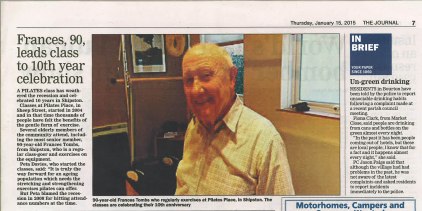Our after-work get together with journalists at the Oxford Mail and Times, February 12th, offered the first opportunity to review the impact of losing almost the entire team of subs.
Over recent weeks, the papers have moved to a new system of production whereby reporters send their copy to a subbing hub in Newport. Here it is assigned, call centre style, to the first person available, who will upload it onto a template, check it, cut it to length, give it a headline, and deal with any picture and caption.
The content management system they use goes by the name of Knowledge – perhaps to remind everyone of the wealth of local knowledge, experience and critical input that it has been brought in to replace.
So what difference has the shift to the new system made?
We learned that the past weeks have been pretty miserable ones, particularly for the departing subs who were asked to smooth the way for their own replacement by continuing to report for work until such a time as management considered they could get along without them.
The reporters don’t have a lot of confidence in the Newport subbing hub. They know that most of the staff there are newly out of college and are on rock bottom pay. And they doubt very much that the sense of collective responsibility for and commitment to the paper is as strong when you are sitting in Newport and working on a wide spread of Newsquest titles, as when you are part of a team of subs and reporters working side by side on a daily basis and seeing the product on the news stands the following day.

Quality suffers
Concerns range from: what happens if something slips through? Who is responsible in the case of libel? to a general awareness that the overall quality of stories suffers when the daily interaction between reporter and sub is lost.
The Newport subbing hub does have a system for raising queries or asking for clarifications, which it does by ringing the newsdesk, though experience so far seems to indicate that this facility is rarely used except for front-page leads.
But reporter–sub interaction is anyway not only for formal queries and clarifications. It can also be useful, for instance, when subs are looking for a catchy headline that can do justice to the story, but want to avoid striking the wrong note. There’s a feeling that this may partially account for the bland character of many headlines coming out of the hub. Subs can also contribute depth to a story through their own knowledge, see links with stories appearing elsewhere in the paper, or alert reporters to possible stories in their patch.
Indeed as one reporter pointed out, the sub on one of the weeklies had effectively been acting as the paper’s editor, so key had he been to locating stories.
Equally if a reporter felt a sub hadn’t got it quite right, a short walk across the newsroom could sort that out. All of that has now been lost.
Unreasonable pressure
Nor is it just the quality of the papers that stands to suffer. Without a team of subs who feel a shared sense of responsibility and can be relied on to cast a critical and knowledgeable eye over stories, to query ambiguities and double-check names, places, titles and dates where necessary, reporters are left feeling exposed and under unreasonable pressure.
They care about the quality of their stories and the papers as a whole, and they feel they need to spend time they don’t have doing some of the work they don’t trust the subbing hub to do.
The good news is that there are fewer vacancies for reporters than there have been for many years. There’s a sizeable group of young journalists none of whom have been at the Oxford Mail/Times for more than a year, and they clearly have confidence in one another, enjoy working together, love journalism and are optimistic about their future.
But they know, as does anyone who has worked on a newspaper, that they can’t sustain a quality paper through their own efforts alone, as has already been demonstrated at other Newsquest titles that have already completed the switch to a subbing hub.
What next?
The Oxford branch and NUJ national officers will continue to work with the Oxford Mail/Times chapel, as well as MPs and others to bring the subbing role back to Oxford.
We will also all be watching closely to see whether the considerable savings Newsquest is making by getting rid of the Oxford subs go the same way as all previous savings from almost a decade of continuous cost cutting – straight into the pockets of the shareholders of the US parent company Gannett. Year on year pay freezes have seen real pay at Newsquest papers drop by between 15% and 20% over recent years, and the NUJ Newsquest group chapel is now putting in for a rise of 3% or £750, whichever is greatest.
The union will also continue efforts to address the gap in pay and conditions that makes the Newport subbing hub such a lucrative option for Newsquest. At a national level, in the run up to the general election, the NUJ is raising the alert over the threat to informed democratic debate that is posed by underinvestment in local papers, and it is calling for a short sharp inquiry into the future of the local press.
